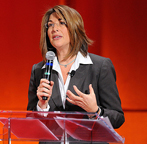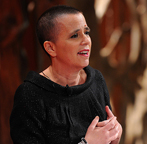When it was announced that the TED enterprise - which features global conferences with idea innovators and change agents - was gearing up to present a TEDwomen conference, there was immediate push back.� Reactions included, "Why are women being siloed? Why not more diversity and gender parity in the TED conferences that are being held?� Is this marginalization?"� There were a lot of question marks.
The conveners took these responses into account when they put together the handsome program booklet titled, �Looking At Women�s Ideas in 2010 is� ___________.”� The adjective was left open.� Getting a jump on the controversy, they asked rhetorically, �How can we be discussing this? How can we be ignoring this?� The real differences between men�s and women�s lives.� With a sense of humor, and a measure of deflection, they suggested on opposite pages: �This is a good start; This is a good way to start a fight.�
Chris Anderson, curator of the TED conferences, and co-hosts Pat Mitchell and June Cohen tackled the topic with a group of attending reporters.� Anderson was emphatic in his declaration, �I couldn�t be more excited about the event.� I think it�s fantastic.� It has all the vibrancy of any TED conference.�� He added that it was his belief that �not too long in the future, the gender lense will go.�� When pressed on whether there would be succeeding TEDwomen events he replied, �This was always planned as a one-off.�� On complaints about the ratio of women speakers at TED he said, �We�re trying to do a better job of integrating women into regular TED programs.� He offered that TEDwomen was �our way of making a quantum leap forward.�� He underscored that in curating any TED, �The goal is always to find the best speakers for a theme.�� His direct comment on, �Why TEDwomen?� was a clear, �Because Pat Mitchell is a force of nature.�

Mitchell described the curation process as beginning with �huge outreach.�� She said, �We were inundated with guest speakers�more than 500 names.�� There were 23 countries represented in the definitive list.� Mitchell said, �The attempt was to represent a broad spectrum and be reflective of women�s stories.�� Cohen compared it to TEDIndia saying, �It�s very much a TED�The rapid-fire exchange of ideas, the transformation of the audience.�� Putting out stats on women speakers at TED events she stated, �Over the past three years we have worked to 30 percent to 45 percent women.�� She reiterated a phrase that I had heard previously about the conference from organizers:� �This is not an either/or; It�s a yes/and.”� She continued, “We�re looking for more diversity.� We wanted the opportunity to take a long look at what�s happening with women.�� She acknowledged that the event, with 700 women in attendance, had brought a huge community of women into the TED fold.
I ran into Dina Kaplan, co-founder of blip-tv early on Tuesday.� She told me, “It was wonderful to be part of the group Pat Mitchell gathered earlier this year, when the idea for a women-focused TED was born.� I don’t see this [conference] as exclusionary.� Women should be a big part of TED, Davos, DLD and other premier events, but it’s okay for us to hole up and speak amongst each other, sharing stories and ideas a few times a year, too. It’s empowering to be surrounded by ambitious, thoughtful women�especially if you’re accustomed to working with men for much of your workday.”
Even Hillary Clinton, a surprise guest speaker, took a shot at the topic during her stint at the podium.� �Why a TEDwomen conference?� she asked.� �To focus on women as agents of change.� Where girls and women flourish, there is success for the world.� It a tenant of our national policy.�
Using the language of music to create the framework and structure for the two days, sessions were broken down into: Overtures, Life�s Symphony, Composers, Duets, Harmony and Discord, and Crescendo.� In an event of this scope, I wasn�t surprised to overhear a comment that raved about a presentation�which moments before someone else had pronounced as �unengaging.�� For me, there were plenty of new faces, equally dynamic as well-known participants Madeleine Albright and Nancy Pelosi.
Journalist Mona Eltahawy grabbed the audience�s attention with her opening line, �I�m Muslim, I�m a feminist, and I�m here to confuse you.� It�s not just about headscarves and hymens.�� Deborah Rhodes, on the medical front, spoke about the work she has been doing with Molecular Breast Imaging (MBI).� Currently FDA approved, the technology is breaking ground in finding small tumors in dense breast tissue.
Tony Porter�s persona and delivery was dynamic. He spoke about his �call to men� to break out of the �man-box.� He related the story of his own path of awakening, from a teenager assuming the macho pose expected of him�to his evolving awareness as a parent.� Pointing out that men�s violence against women is at an all-time high, he exclaimed, �My liberation as a man is tied to your liberation as a woman.�

Penelope J. Chaffer & Tyrone Hayes
Documentary filmmaker Penelope Jagessar Chaffer and biologist Tyrone Hayes teamed up to inform the audience about the chemicals affecting our planet and its impact on humans, particularly children.� Hayes, very humorous about some not very funny issues, discussed how we were losing species from the earth as a result of toxic elements in the environment.� His studies with frogs, and what it tells scientists about how humans may be affected when exposed to the pesticide Atrazine, was downright scary.
Naomi Klein also dealt with the relationship to the environment in her talk, �On Precaution.� �Monitoring the BP oil disaster in the Gulf, she spent a week on a research vessel with a scientific team from the University of South Florida. Their investigation found that water with even trace amounts of oil and dispersants could be highly toxic to the microorganism phytoplankton�essential to the marine food web.� Klein assailed a mind-set she named the �techno-fix��the concept that technology will save us.�

Naomi Klein
She raised the red flag on how we get ourselves into untenable situations.� �Why are we using cost/analysis as a yardstick?� she asked.� Why are we putting our foot on the accelerator when we should be putting it on the brakes?�� For Klein, the reasons are based on a false sense of security.� She also noted that those on the right had recast these concerns as �a culture issue and a threat to our way of life.�� Speaking later with reporters she said, �This isn�t a fight about the science.� Yes, climate change forces us to accept limits, [like] giving up SUVs and and redistributing the wealth.�� Discussing the effects of our consumption on the planet, Klein underscored, �This [BP oil spill] was a transformative moment.� What has this disaster changed?� People in their own communities are ready to push back and use the precautionary concept.�
During Tuesday night�s welcome dinner, there was a �bonus session� with a lineup that included Madame Callista Mutharika and Sia Nyama Koroma, the first ladies of Malawi and Sierra Leone, respectively.� They outlined the work they are doing to improve the lives of women in their countries.� Clean water, education, healthcare, and maternal mortality are top concerns.� In Malawi, one in eight women die in childbirth.

Malaya Pinas
For me, the most powerful voice of the evening was Malaya Pinas from the Philippines, an on-the-ground writer getting her work out through the World Pulse �Voices of our Future � program.� Her message to the gathering about the women of her country was, �We are not servants of the world.� We are not your domestic workers or your mail-order brides.� We are not little brown fucking machines to be used by United States serviceman. We are servants of peace and freedom.� When our whispers become a trumpet, we will become a power for change.�
The following day showcased those making statements in the cultural arena.� Palestinian-American poet, playwright, and political activist, Suheir Hammad read one of her works, �What I Will.�� Shirin Neshat, the Iranian-born artist who works in photography, video, and film, spoke about her directorial debut, Women Without Men, which she described as a film �balanced between the political and the feminist.�
In the closing session, Johanna Blakley persuasively articulated about social media as the �end of assumptions about gender.�� She posited that women were driving the social media revolution, declaring, �They dominate the space.�� Blakely offered that social media “allows us to escape our demographics.”� She explained, “When you look online at the way people aggregate and organize, it’s not around age.� It’s around interests.”
Listening to diplomat and humanitarian Stephen Lewis speak� was an eye-opener.� He gave his talk with a no-nonsense attitude and a brutal frankness about the United Nations� dismal record on gender parity.� His take-no-prisoners manner highlighted that women were second-class citizens in that world body.

Eve Ensler
Pat Mitchell introduced the closer with the line, �Who would want to be the final speaker? Someone very, very, brave.�� That person was Eve Ensler.� She wrapped up the two days with passion and energy.� Not surprising.� The playwright/activist and founder of V-Day, which has raised $75 million to end violence against women and girls, is a vibrant orator. She verbalized how her disconnect from her body was due to violence in her background. When she connected with her vagina, she was driven.� In coming to terms with her uterine cancer (she is now nine months cancer free), she saw it as, “The cancer that is everywhere from the carelessness.”� Through what came to be her realizations, she was able to draw analogies between her body and the earth. She said, “I know that everything is connected.”
There were numerous personal stories interwoven through the talks that dealt with overcoming obstacles and fighting tirelessly for social change.� The most visceral image that will stay with me as a metaphor for determination came from a video excerpt presented by the conservationists and filmmaking team of Beverly and Dereck Joubert. They presented a difficult to watch clip of an elephant being attacked by a pack of lions.� The footage showed the elephant�s hide being torn as one lion attacked its flank and another jumped onto its back, sinking in its teeth and claws.� The elephant went down, unable to fight back.� It appeared defeated.� Yet as definitively as it capitulated to the force of the lions, it then miraculously rallied to stand up and shake itself loose from the predators.
It was a reminder that as difficult and overwhelming challenges can be, either personal or global, there is always the possibility for triumph and hope.
Photos: James Duncan Davidson/TED
This article originally appeared on the website mgyerman.com.
Click below to e-mail this article to a friend
or to post a link on your favorite sites.
Thank you!
 |
